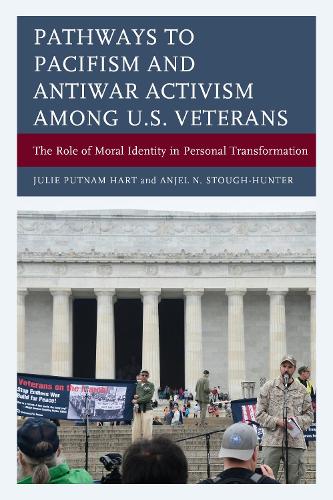
Pathways to Pacifism and Antiwar Activism among U.S. Veterans: The Role of Moral Identity in Personal Transformation
(Paperback)
Available Formats
Publishing Details
Pathways to Pacifism and Antiwar Activism among U.S. Veterans: The Role of Moral Identity in Personal Transformation
By (Author) Julie Putnam Hart
By (author) Anjel N. Stough-Hunter
Bloomsbury Publishing PLC
Lexington Books
7th February 2020
United States
Classifications
Professional and Scholarly
Non Fiction
Gender studies: men and boys
Violence and abuse in society
Relationships and families: advice, topics and issues
Military forces and sectors
Social theory
362.860973
Physical Properties
Paperback
214
Width 152mm, Height 225mm, Spine 16mm
327g
Description
Pathways to Pacifism and Antiwar Activism among U.S. Veterans seeks to answer the question of how and why some military personnel become antiwar activists. To examine this, the authors look at the stories of 114 veterans pathways from a militaristic perspective to either a Just War or pacifist perspective. Identity theory provides a lens for exploring this process. The authors argue that this postservice process of identity transformation is not pathological but healthy, as it offers healing and verification of multiple roles and social aspects of the veterans lives.
Reviews
Through in-depth interviews of U.S. veterans who have become antiwar activists, Hart and Stough-Hunter make three important contributions to an informed citizenry: 1) empathy for the trauma many of our veterans have experienced in serving our country; 2) an interpretive analysis of sociological identity theory to help us understand how the processes of moral injury, betrayal, religious reorientation, and education contribute to identity transformation; and 3) practical recommendations for the U.S. military and faith communities to foster healing and reintegrate veterans into civilian life. -- Duane K. Friesen, emeritus, Bethel College (KS)
An important, well-researched study explaining why and how some of us who serve in the military choose to speak out against war and in the process gain a stronger sense of personal identity and life purpose. -- David Cortright, University of Notre Dame
In this book, Julie Putnam Hart and Anjel N. Stough-Hunter combine to provide perspective, theory, and findings rarely available to us as citizens or as social scientists. As citizens, we read more than the stories of former soldiers. Rather we have a detailed, poignant recounting of the wrenching, inner struggles for moral meaning by those who experienced combat. The authors deepen these individual stories by their rich development of identity theory and the various factors which contribute to the redefined pacifist beliefs to which these former combatants arrive. The book provides analysis that life-long pacifists, career military people, and social science will discuss for years to come. -- George A. Lopez, University of Notre Dame
Reading this book may revive your faith in the possibility of individual change and the importance of education, inspiration, and social movements in helping us to be fully human and deeply humanized. Focused on the dramatic identity change that comes when a soldier realizes that war is not a path to peace, the stories unfolded in this book open for us important understanding of the catalysts for moral and political identity change. Some change quickly in the midst of brutal situations that expose deep moral conflict in war and the hierarchical power of patriarchy; for others it takes years of thinking and interacting with others to find their own understanding of war and its use changing. Appropriately, the authors show the complexity of the change process and the reader is left with a more genuine understanding of how a commitment to peace-making is built. -- Lynne M. Woehrle, Mount Mary University
Author Bio
Julie Putnam Hart is associate professor of sociology at Ohio Dominican University.
Anjel Stough-Hunter is assistant professor of sociology at Ohio Dominican University.
